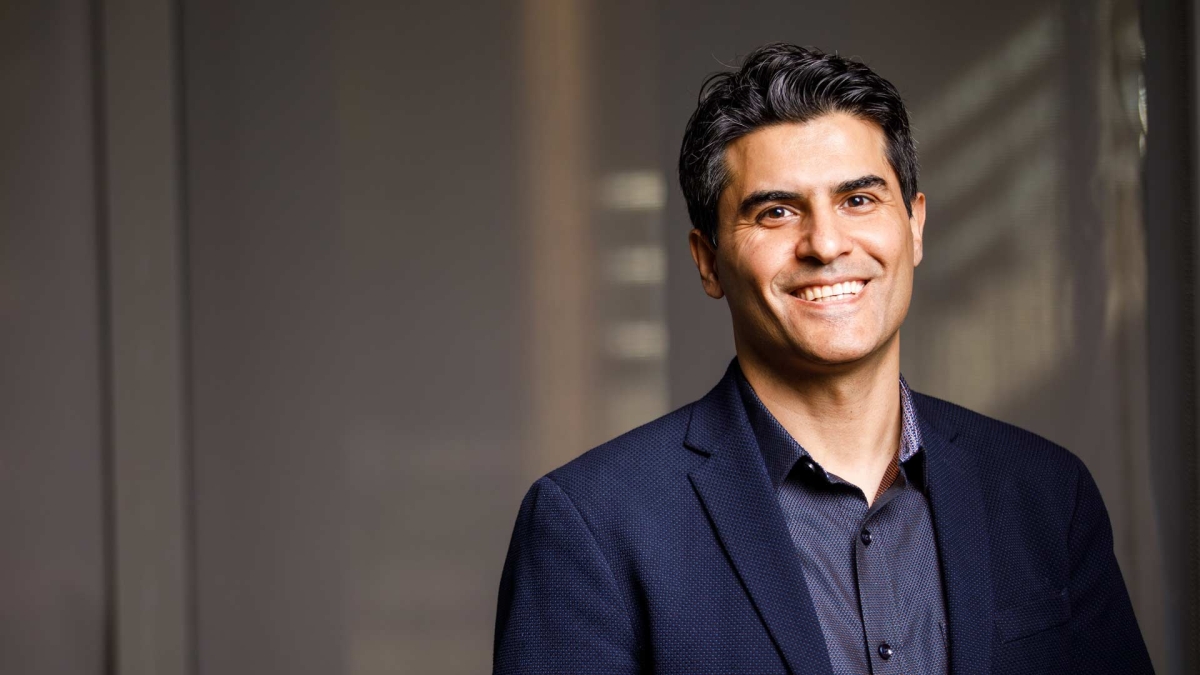'Tissue-on-a-chip' tech nets honor for ASU researcher

Mehdi Nikkhah, an associate professor of biomedical engineering in the Ira A. Fulton Schools of Engineering at ASU, was recognized as a rising star in his field by being named a senior member of the National Academy of Inventors, thanks to his disease-fighting tissue-on-a-chip technology. Photo by Andy DeLisle/ASU
Mehdi Nikkhah, an associate professor of biomedical engineering in the Ira A. Fulton Schools of Engineering at Arizona State University, is one of 95 inventors to be named a 2023 senior member of the National Academy of Inventors, or NAI, in February.
These senior members represent the people the NAI annually recognizes as rising stars among the faculty, scientists and administrators in its member institutions. They are successful in the areas of patents, licensing and commercialization, and they have produced technologies that could benefit or have benefitted the welfare of society.
The 2023 class of NAI Senior Members represents 50 research universities, governmental entities and nonprofit institutions worldwide. The senior members are named inventors on more than 1,200 issued U.S. patents.
Nikkhah’s nomination for the honor came from Michael Kozicki, an electrical engineering professor in the Fulton Schools and fellow of the National Academy of Inventors. Nikkhah says Kozicki’s work is an inspiration and that he appreciates his support.
Nikkhah, who is also a faculty member in the Biodesign Virginia G. Piper Center for Personalized Diagnostics, holds five issued U.S. patents and has five invention disclosures under review. His research interests focus on the integration of micro- and nanoscale technologies, innovative biomaterials and biology to better understand the mechanisms of disease progression in humans. He also develops regenerative medicine strategies to treat organ and tissue failure.
Heather Clark, director of the School of Biological and Health Systems Engineering, part of the Fulton Schools, says, “Professor Nikkhah’s entrepreneurial work has elevated tissue-on-a-chip technology from a lab-based device to a screening tool that has uncovered new knowledge about cancer and other diseases. This honor demonstrates both the pioneering nature of his work as well as the potential for making a significant impact on medicine.”
Curiosity and creativity lead Nikkhah to think outside the box in his work.
“My passion is to establish an entrepreneurship vision to create innovative technology platforms to solve complex biomedical engineering problems,” says Nikkhah, who is also an associated faculty member in the ASU Biodesign Virginia G. Piper Center for Personalized Diagnostics.
His contributions have resulted in a better understanding of the biological mechanisms of complicated diseases such as cancer and cardiovascular abnormalities. His work is centered on tissue-on-a-chip technology involving engineered microsystems that represent human tissue and organs in both structure and function.
“Our lab has pioneered the development of next-generation, innovative tissue-on-a-chip technologies and organoid models with the use of patient-derived or stem cells and advanced biomaterials,” Nikkhah says. “We have thus far developed numerous diseased tissue-on-a-chip technologies, including breast and brain tumors-on-a-chip, heart attack-on-a-chip and fibrosis-on-a-chip.”
Nikkhah says that he and his team are proud of their engineered organ-on-a-chip technologies.
“Using these innovative technologies, we have been able to unveil and discover novel molecular targets or genes that accelerate the spread of diseases such as cancer,” he says. “For instance, our studies in breast cancer using tumor-on-a-chip technologies demonstrated that stromal cells enhance tumor invasion by inducing a novel gene of interest.”
Nikkhah says he and his team’s research on glioblastoma, an aggressive type of brain tumor, has led to discoveries of novel cellular signaling that promote tumor invasion. These discoveries could ultimately benefit patients’ treatment outcomes and survival.
“Using our microengineered tissue-on-a-chip technologies, we are expanding our studies into other diseases such as aging-related dementia,” Nikkhah says. “I am also very passionate about educating and training the next generation of entrepreneurs from our students and scholars.”
Nikkhah joins the ranks of eight NAI Senior Members in the Fulton Schools and 17 NAI Senior Members across all of ASU, an NAI Sustaining Member Institution. ASU also has 13 NAI Fellows, including five from the Fulton Schools.
The new senior members will be inducted at the Senior Member Ceremony at the 12th Annual Meeting of the National Academy of Inventors on Monday, June 26, in Washington, D.C.
More Science and technology

Hack like you 'meme' it
What do pepperoni pizza, cat memes and an online dojo have in common?It turns out, these are all essential elements of a great…

ASU professor breeds new tomato variety, the 'Desert Dew'
In an era defined by climate volatility and resource scarcity, researchers are developing crops that can survive — and thrive —…

Science meets play: ASU researcher makes developmental science hands-on for families
On a Friday morning at the Edna Vihel Arts Center in Tempe, toddlers dip paint brushes into bright colors, decorating paper…

